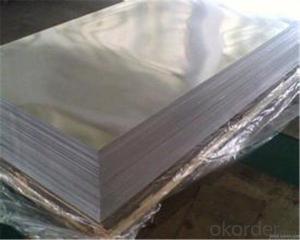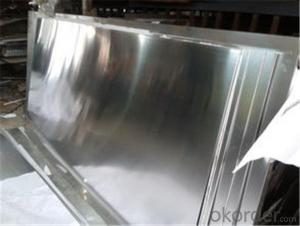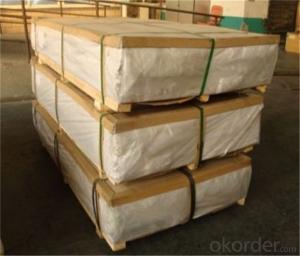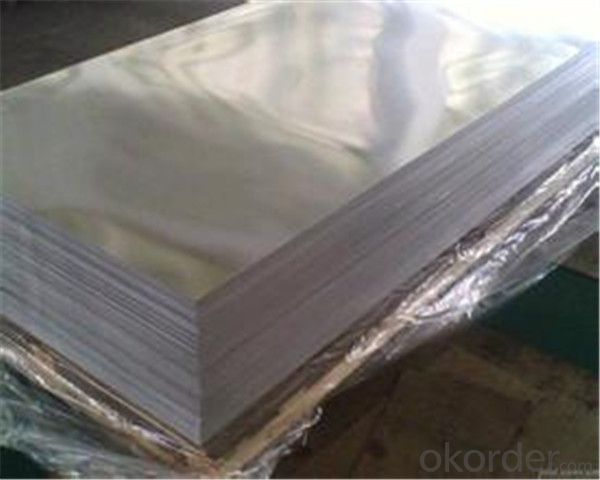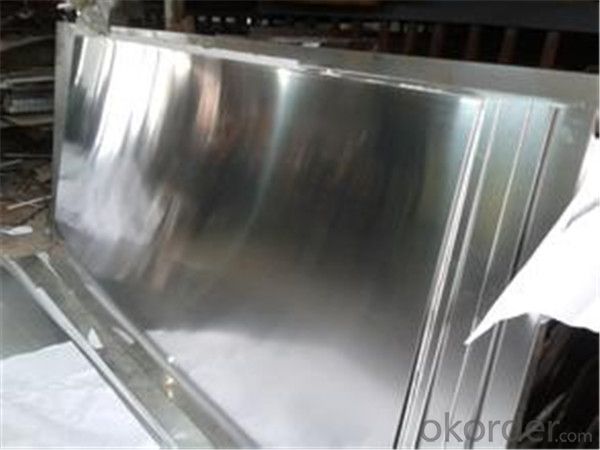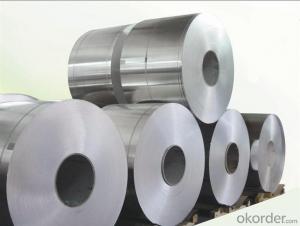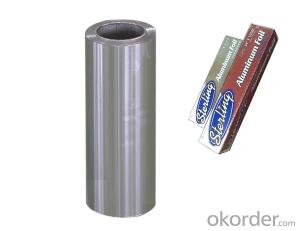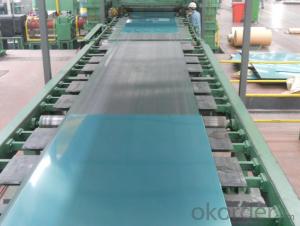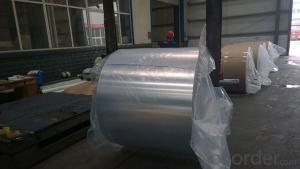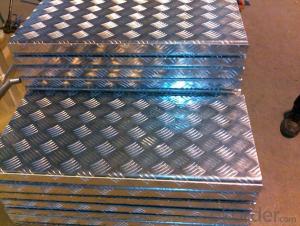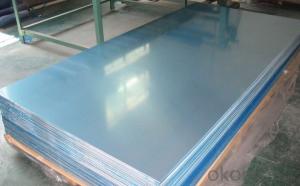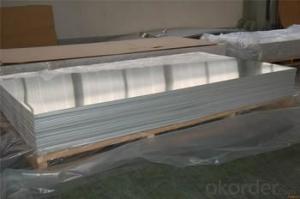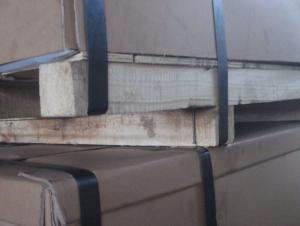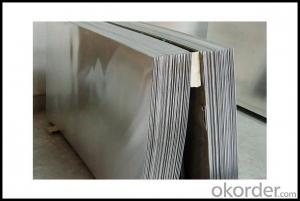Aluminum Sheet Metal Sheets - Decorative Mirror Finish Anodized
- Loading Port:
- Shanghai
- Payment Terms:
- TT OR LC
- Min Order Qty:
- 5 m.t.
- Supply Capability:
- 10000 m.t./month
OKorder Service Pledge
OKorder Financial Service
You Might Also Like
Product Description
Decorative Mirror Finish Anodized Aluminum Sheet is also known as Trandplate, Floor Plate, Chequer Plate, Checkered Plate, Chequered Floor Plate, Checker Plate and Check Plate. It is made of anti-corrosion aluminum alloy stock, rolled with special and beautiful embossing shape. It has the property of anti-sliding, anti-corrosion,easy cleaning and high mechanical strength.
l Specification
Description of aluminum alloy sheet | |
Alloy No: | 1100 1050 1060 1070 1230 3003 3004 3005 3104 3105 5005 5052 5754 5083 |
Temper: | O -- H112 |
Thickness: | 0.08-150mm |
Width: | 150-2000m |
Surface Quality: | Free from Oil Stain, Dent, Inclusion, Scratches, Stain, Oxide Discoloration, Breaks, Corrosion, Roll Marks, Dirt Streaks and other defect which will interfere with use. |
Packaging: | Wooden pallets with paper intereaved or customized packing ways are welcomed |
Application: | construction , decoration,packaging, printing. |
Loading Port: | Shanghai (any port in China). |
Remark: | Specific requirement of alloy grade, temper or specification can be discussed at your request. |
MOQ: | 5 Tons |
Price term: | FOB, CFR, CIF |
Payment term: | TT, L/C |
Packaging & Shipping
Packaging detail: wooden cases that are suitable for long distance exporting
Delivery detail: 25-30 days after receiving L/C or payment in advance
Photos
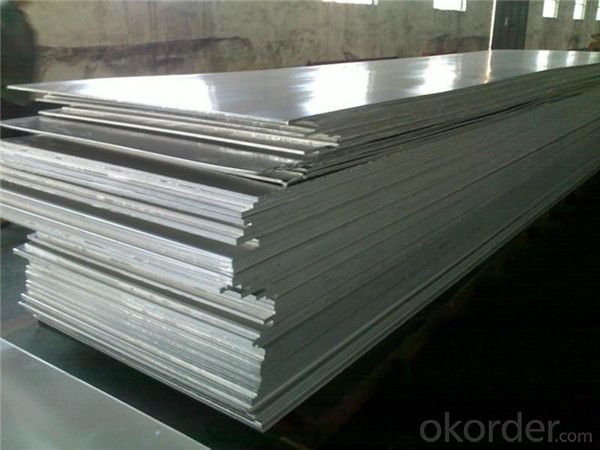
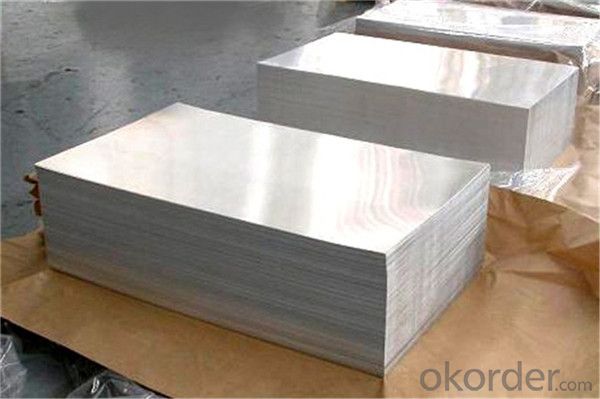
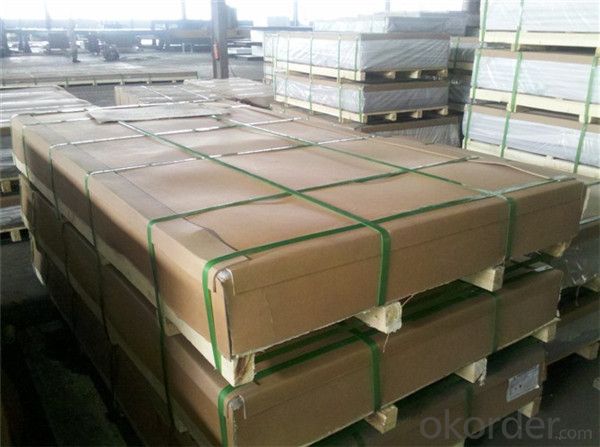
- Q: How does the thickness of aluminum sheet affect its formability?
- The thickness of an aluminum sheet has a significant impact on its formability. Generally, thinner sheets of aluminum are more malleable and easier to shape compared to thicker sheets. This is because thinner sheets have lower resistance to deformation and require less force to bend or stretch. Thicker aluminum sheets, on the other hand, have higher resistance to deformation and are less malleable. They require more force and energy to shape, and may be more prone to cracking or tearing during forming processes. Thicker sheets also have a higher likelihood of experiencing springback, where the material partially returns to its original shape after being formed. The formability of aluminum sheets is also influenced by the alloy composition and the specific forming process being used. In some cases, certain alloy compositions or heat treatments can enhance the formability of thicker sheets, making them easier to shape. In summary, the thickness of an aluminum sheet directly affects its formability. Thinner sheets are generally more malleable and easier to shape, while thicker sheets require more force and are less malleable. The alloy composition and specific forming processes being used can also impact the formability of aluminum sheets.
- Q: What are the different types of surface treatments for aluminum sheets in the marine industry?
- Some of the different types of surface treatments for aluminum sheets in the marine industry include anodizing, powder coating, chromate conversion coating, and painting.
- Q: What is the typical modulus of elasticity for aluminum sheets?
- The typical modulus of elasticity for aluminum sheets is around 70 GPa (gigapascals) or 10 million psi (pounds per square inch). However, it is important to note that the modulus of elasticity can vary depending on the specific alloy and temper of the aluminum sheet.
- Q: How do I prevent corrosion on aluminum sheets?
- To prevent corrosion on aluminum sheets, there are a few steps you can take: 1. Clean the aluminum sheets regularly: Use a mild detergent or aluminum cleaner to remove any dirt, grime, or chemical residues that may be present on the surface. This will prevent the buildup of corrosive substances. 2. Apply a protective coating: Consider applying a protective coating on the aluminum sheets. There are various types of coatings available, such as clear coats, anodizing, or painting. These coatings act as a barrier between the aluminum and the surrounding environment, preventing corrosion. 3. Avoid contact with corrosive substances: Aluminum can be susceptible to corrosion when it comes into contact with certain chemicals, such as acids, alkalis, or saltwater. Be mindful of the environment in which the aluminum sheets are stored or used and avoid exposure to these corrosive substances. 4. Use proper storage methods: Store aluminum sheets in a dry environment with low humidity levels. Moisture can accelerate the corrosion process, so it's important to keep the sheets dry and protected from excessive moisture. 5. Implement preventive measures: Consider using corrosion inhibitors or anti-corrosion sprays specifically designed for aluminum. These products can provide an extra layer of protection against corrosion, especially in harsh or corrosive environments. By following these preventive measures, you can significantly reduce the risk of corrosion on aluminum sheets and prolong their lifespan.
- Q: What are the different alloy compositions available for aluminum sheets?
- Aluminum sheets offer a variety of alloy compositions, each with its own distinct properties and applications. There are several common alloy compositions to consider. Firstly, we have 1100, which stands out for its exceptional corrosion resistance and high thermal conductivity. This alloy finds its place in chemical equipment, heat exchangers, and food processing equipment. Next, 3003 presents good formability, moderate strength, and excellent corrosion resistance. It is commonly employed in packaging, tanks, and architectural applications. Moving on to 5052, this alloy boasts high strength and good formability. It is often utilized in marine applications, as well as in aircraft and automotive parts. For those seeking excellent strength, good formability, and high corrosion resistance, 6061 is the alloy of choice. It is commonly found in structural applications like bridges, buildings, and transportation equipment. Lastly, we have 7075, known for its remarkably high strength and good machinability. Aerospace applications, as well as high-stress parts in the automotive and sporting goods industries, benefit from this alloy. These examples merely scratch the surface of the numerous alloy compositions available for aluminum sheets. The selection of the appropriate alloy hinges on specific application requirements, such as strength, corrosion resistance, formability, and machinability.
- Q: Can the aluminum sheets be used for manufacturing musical instruments?
- Yes, aluminum sheets can be used for manufacturing musical instruments. Aluminum is a lightweight and versatile material that offers several advantages for instrument manufacturing. It is known for its excellent sound transmission properties, which makes it suitable for creating resonant and vibrant tones in musical instruments. Additionally, aluminum is highly durable and resistant to corrosion, ensuring that the instruments will withstand the test of time. Many percussion instruments, such as cymbals and bells, are commonly made from aluminum sheets due to their ability to produce clear and rich sounds. Moreover, aluminum can also be shaped and formed into various instrument components, making it a popular choice for constructing brass instruments like trumpets and trombones. Overall, aluminum sheets are a viable option for manufacturing musical instruments and have been successfully utilized in the industry.
- Q: Can aluminum sheets be used for sound insulation?
- Yes, aluminum sheets can be used for sound insulation. Aluminum has good soundproofing properties due to its high density and ability to reflect sound waves. When used as a barrier or in combination with other sound-absorbing materials, aluminum sheets can effectively reduce noise transmission.
- Q: How do you prevent oil or grease stains on aluminum sheets?
- To prevent oil or grease stains on aluminum sheets, there are a few measures you can take: 1. Clean the aluminum sheets regularly: Regularly cleaning the aluminum sheets will help remove any existing oil or grease stains and prevent them from accumulating. Use a mild detergent or a mixture of water and vinegar to clean the sheets. Avoid using abrasive cleaners or scrubbing pads as they may damage the surface. 2. Apply a protective coating: Applying a protective coating can act as a barrier between the aluminum surface and oil or grease. There are various coating options available, such as clear lacquer or anodizing. These coatings create a smooth and non-porous surface, making it harder for oil or grease to penetrate and stain the aluminum sheets. 3. Use a barrier material: If you frequently work with oil or grease near aluminum sheets, consider using a barrier material to prevent direct contact. This could include using a silicone mat or placing a layer of parchment paper or aluminum foil between the aluminum sheet and the oil or grease source. 4. Store aluminum sheets properly: Proper storage is essential to prevent oil or grease stains on aluminum sheets. Make sure to store them in a clean and dry environment, away from any potential sources of contamination. Keep the sheets covered or wrapped in a protective material to prevent dust, dirt, or oil from settling on the surface. 5. Handle aluminum sheets with clean hands: When handling aluminum sheets, ensure your hands are clean and free of oil or grease. Even small amounts of oil or grease on your hands can transfer onto the sheets and cause stains. If necessary, wear clean gloves or use clean tools when working with aluminum sheets to minimize the risk of stains. By implementing these preventive measures, you can significantly reduce the chances of oil or grease stains on your aluminum sheets, keeping them clean and in good condition.
- Q: Can aluminum sheets be used for automotive heat shields?
- Yes, aluminum sheets can be used for automotive heat shields. Aluminum is a lightweight and highly heat-resistant material, making it suitable for shielding the vehicle's components from excessive heat generated by the engine or exhaust system. Its high thermal conductivity helps dissipate heat effectively, making it a popular choice for automotive heat shields.
- Q: Are aluminum sheets suitable for medical applications?
- Yes, aluminum sheets are suitable for medical applications. Aluminum is a lightweight and durable material that is resistant to corrosion, making it suitable for medical equipment and devices. It is commonly used in the production of medical instruments, diagnostic imaging systems, and surgical trays. Additionally, aluminum sheets can be sterilized easily, further enhancing their suitability for medical applications.
Send your message to us
Aluminum Sheet Metal Sheets - Decorative Mirror Finish Anodized
- Loading Port:
- Shanghai
- Payment Terms:
- TT OR LC
- Min Order Qty:
- 5 m.t.
- Supply Capability:
- 10000 m.t./month
OKorder Service Pledge
OKorder Financial Service
Similar products
Hot products
Hot Searches
Related keywords
